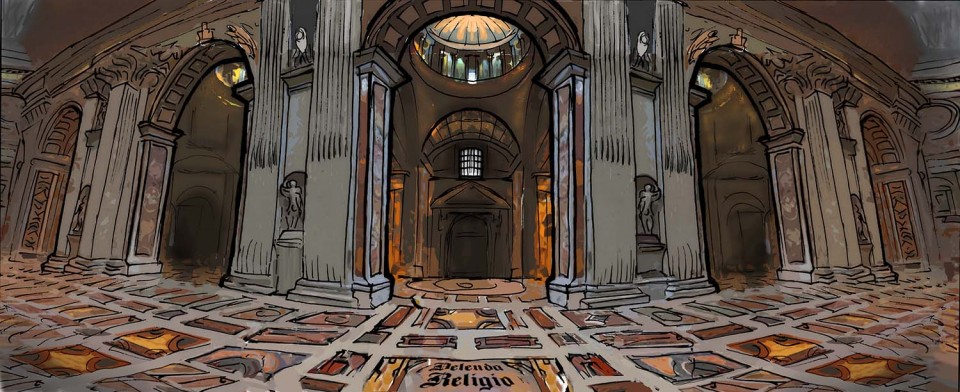Tags
"Connaissance Ignorance Mystère", Beethoven, Certitude, Communism, DAECH, Doubt, Edgar Morin, Nazism, Victor Hugo
We glibly pronounce the phrase, oblivious of the fact that our “certitude” is not only often not shared by others, but is entirely subjective and subject to contradiction later – even by ourselves. “I was certain about it but I found out that I was wrong” : the story of my personal itinerary “From Illusions to Illumination”. And today, as an atheist, can I claim honestly that I have no doubts about God’s non-existence ? Of course I can ! But my certitude is subjective and not necessarily contagious. You may find it hard to believe, but I have been known to fail, on occasion, in converting some Believers on the Brink . . .
It is not false modesty to say that none of us possesses absolute truth. Humility is honesty, and if we are honest we must admit that our search for truth will always involve an element of mystery, beyond our grasp. It is, as we suggested in an earlier post, quoting Victor Hugo, “asymtotical” (“The Unreachable Stars”, October 5, 2016).
Another great French intellectual, now aged 96, has just published another ground-breaking book, “Connaissance, Ignorance, Mystère” (“Knowledge, Ignorance, Mystery”). Edgar Morin, sociologist and philosopher, world-famous for his research and reflections on complexity, has become fascinated by the phenomenon of what he calls “ecstasy” and “trances of esthetic emotion”, when, for example, inspired people like Beethoven step, as it were, outside of themselves (the etymology of “ecstasy”) and produce the Ninth. The greatest works of art, including literature, says Morin, seem to be created in a sort of transrational (my word) trance (unlike – need I add ? – posts in this Blog …).
Morin spoke of certitude recently in an interview (“Le Monde des Religions”, No. 86) about his latest book. “Even science”, he says, “cannot produce certainty.” He reminds us that “scientific theory can be refuted, different from religious dogma which is irrefutable, at least for believers.” He went on to say : “Beware the impression of possessing the absolute certitude which religion gives . . . Once the human spirit has created gods, they take on an incredible existence, force and power. They become capable of saying to those who created them : ‘Kneel before me, pray, kill for me !’. This is the unheard-of power gods acquire, as do ideologies : Nazism and Communism (Morin was himself once a Communist, before being evicted from the Party) were quasi-religions. At present, with the Daech assassins, we clearly see the danger of the absolute. To possess an absolute is madness.” Readers may see in this, as I do, a justification of the title of our Blog : “Blind Faith, Blind Folly”.
All this is a word to the wise – atheists as well as non-atheists – reminding us all that like absolute power, absolute certitude absolutely corrupts. That, at least, can be said without a doubt.
RIDENDA RELIGIO

An interesting post which raises more questions than might be expected.
I might suggest that any claim to belief in a matter which cannot be demonstrated or proven scientifically is necessarily subjective. Frank’s qualification of his certitude in God’s non-existence, that his certitude is subjective, is perhaps therefore superfluous. He nevertheless does not resile from absolute certitude on this matter. The warning in his final paragraphs is therefore surprising. Are we to believe that he is confessing obliquely to being corrupted by his absolute certitude? He would no doubt agree that the absolute certitude of his younger self in God’s existence was itself a “corrupting” certitude. But what are we to make of a revised, albeit subjective, certitude?
LikeLike
Like many of the things I write, some of the statements in this post are (without a doubt) superfluous. I have said often enough that the only genuine certitude one can have is the truth of axioms, such as 2+2 = 4. But we so often say that we are convinced that we are right, I thought it useful to recall the self-evidence of the subjectivity of our certitude. “Cela va sans le dire, mais il va mieux en le disant” – “That goes without saying, but it goes better by saying it.”
“I have no doubts about God’s non-existence”, as, in my younger years “I was certain” about His existence. Neither is a statement of absolute, axiomatic certitude. My present “certitude” is not “revised” because it never was an absolute certitude, but necessarily a subjective one. In common parlance, “I am certain” means “I am sure, convinced of it; I have no doubts about it”. Some people think they have absolute certitude about something – until they discover they were mistaken. In a word, I agree with Morin : to claim “to possess an absolute is madness”. I will continue to deny the existence of God until, as you say, the contrary is “demonstrated or scientifically proven”. I am not holding my breath.
LikeLike
Each day the moment when we will have the proof that god does not exist is nearer … but we will be unable to get the satisfaction of noticing that we were right …(lol)
LikeLiked by 1 person
Excellent comment, cher ami. The disappointing truth is that we will not be able to gloat that we were right !
LikeLike
Apropos of Laroche’s comment, I recently asked my god-son, who has a Ph.D in Economics and a B.E. in Electrical Engineering (beats my mere B.E. (Hons 1) and LL.B.) whether it was possible to prove the non-existence of a non-existent entity.I was unsurprised when he replied “No! It is logically not possible”. So I guess the moment that we all hope for is not likely to arrive any time soon. What we should take from this is that the onus is squarely on those proposing the existence of “God” to substantiate their claims. I won’t be holding my breath.
LikeLiked by 1 person
AMEN !
LikeLike